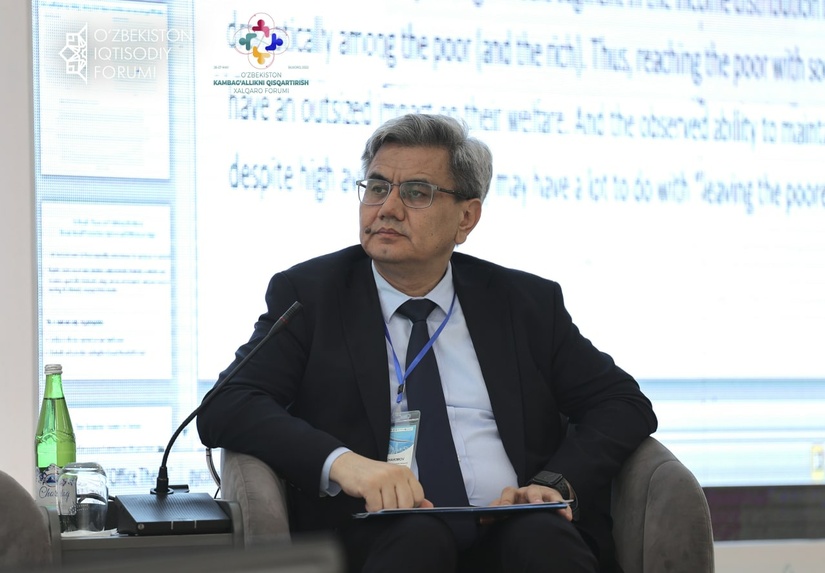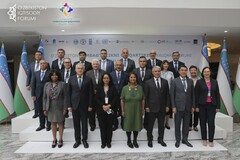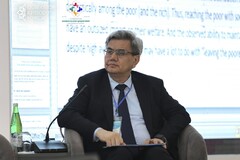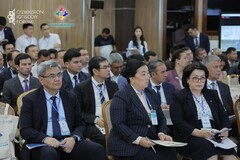The issues of poverty reduction, improving living standards and people's well-being as the main priorities of state policy are reflected in many speeches of heads of State and on the agenda of international organizations.
In his speeches at the 75th and 76th sessions of the UN General Assembly, President of the Republic of Uzbekistan Shavkat Mirziyoyev emphasized the need to unite global efforts in the fight against poverty, especially during the pandemic and after it. At the beginning of 2020, the President identified the issue of poverty reduction as the main task of state policy. To this end, in order to effectively fulfill the tasks set before us, that is, to reduce poverty, improve the quality of life of people, discuss and exchange views with world and regional experts on the work done in our country to achieve the Sustainable Development Goals and future plans, as well as to strengthen cooperation with international organizations, for the first time on May 26-27 this year "The International Forum on Poverty Reduction in Uzbekistan" was held in Bukhara. The director of the Center for Economic Research and Reforms, Obid Khakimov, was also taking part in it.
“At this Forum, for two days in the beautiful city of Uzbekistan, Bukhara, economists from many countries of the world exchange views on the global problem of combating poverty. Along with the study of world experience, the work done since 2020 by the head of our state to combat poverty and its results are also discussed.
Yesterday, former Finance Minister of the Republic of Turkey Lutfi Elvan admitted that “the policy of Uzbekistan to create jobs is one of the most effective tools in the fight against poverty.”
In addition, the work done in the fight against poverty as a result of the implementation of our program "Every family is an entrepreneur", the introduction of the "Iron Book", "Youth Book" and other targeted measures are being discussed. Their effectiveness has also been recognized by international experts.
If we consider innovations to combat poverty, a number of unique innovations have also been introduced in Uzbekistan since 2020. The results that these innovations bring are being actively discussed at today's conference.
For example, only the introduction of the system of the assistants to khokims and the results obtained in a short time from this were evaluated with great interest by international experts. Today, international experts are expected to visit the field to familiarize themselves with the work of khokim assistants.
When we talk about the fight against poverty, we must emphasize that we have set ourselves the goal of halving poverty during 2022-2026.
There are different methods of measuring poverty:
- Financial methods are when poverty is measured by money.
- More modern methods are criteria for measuring multidimensional poverty.
In this direction, the Center for Economic Research and Reforms, together with UNDP, UNICEF, is conducting pilot studies. These pilot studies to measure the level of poverty study not only family income, but also opportunities for education, medical care, utilities and a number of other equally important conditions for human life. Such a study has been conducted in a number of countries, and currently, results of measuring multidimensional poverty have been obtained in more than a hundred countries. The most important aspect in this is to properly direct public policy.
Multidimensional measurement of poverty is very important for the effective allocation of public funds”.
The fact that in recent years the issue of poverty reduction in our country has become one of the most important issues of state policy, as well as the work done in this direction and the results achieved in a short time, aroused the interest of many international organizations and experts in the Forum.
The coronavirus pandemic served as a great experience and lesson and provided an opportunity to draw conclusions about the next directions of anti-poverty policy. The world has once again become convinced of the importance of investing in human capital, education and the healthcare system, as well as the importance of having financial and economic resources to withstand such unforeseen processes.
In particular, the available macroeconomic resources have largely helped Uzbekistan to attract the necessary resources in the shortest possible time and form an Anti-Crisis Fund. This allowed our country to work in three main areas:
- Strengthening of the healthcare system (construction of new hospitals, increase in the number of beds, new medical equipment, purchase of medicines and vaccines, stimulation of medical staff, etc.).
- Improvement of the social protection system (including the expansion of coverage of families in need of social protection, as well as assistance from the state for the population affected by the pandemic).
- Provision of tax benefits and vacations, deferred payments on loans, as well as support for enterprises in the real sector of the economy through other types of financial intermediation.
In particular, to expand the scale of support for the population in need of social protection and its effective organization, a system was formed - the "Iron Notebook".
Over the past period, by providing employment to 705.2 thousand able-bodied unemployed out of almost 2.7 million members of 651.0 thousand families included in the "Iron Notebook", 601.3 thousand families were excluded from it. Measures have been taken to create a permanent source of income for families included in the "notebook". In particular, 96.6 thousand citizens were employed for permanent work, and 34.7 thousand citizens established entrepreneurial activity. In addition, 16.5 thousand citizens have been trained in the specialty.
Measures are being taken to support families in need of social assistance who have lost a breadwinner and have a disability.
For reference: 20.0 thousand low-income families who lost a breadwinner, 38.0 thousand families with disabilities in need of social assistance were registered. As a result, 75% (1.8 thousand out of 2.4 thousand) of the homes of families with disabilities who needed repairs were repaired.
In addition, medical, psychological and legal assistance is provided to families included in the "notebook" on an ongoing basis. In particular, out of 14.5 thousand low-income families in need of medical protection, members of 13.6 thousand (or 93.8%) families underwent a medical examination.
To date, at the expense of the funds of the "Sakhovat va Kumak Foundation", 293.2 thousand families included in the "Iron Notebook" have been provided with financial assistance in the amount of 279.7 billion sums.
In addition, work was carried out to create and strengthen the institutional framework for the implementation of the new poverty reduction program. In particular, in 2020-2021, the number of families receiving benefits from the state budget has more than doubled, their share has reached about 15%.
To measure the level of poverty, a new criterion has been introduced – minimum consumer spending. This made it possible to revise the minimum amount of social benefits and allowances. For example, in 2021, the amount of minimum pensions and benefits for disabled people, as well as families who have lost a breadwinner, increased by 10-50%.
Mutually beneficial cooperation with a number of countries and international organizations also played an important role in the process of making the necessary decisions and measures to reduce the consequences of the pandemic.
In 2022-2026, Uzbekistan began the active implementation of the "New Uzbekistan" Development Strategy, which, first of all, is based on the principles of "For Human Dignity and Value". The main objectives of economic development are aimed at halving poverty by 2026. The main condition for achieving these goals is to ensure macroeconomic stability and sustainable economic development.
In particular, the goal is to increase GDP per capita from the current $2,000 to $2,800 by 2026. This will create conditions for the transition to a higher, middle-income group of countries by 2030. Within the framework of the tasks set, the transformation and privatization of state-owned enterprises and banks, the development of agriculture, the transition to a green model of economic growth, improving business conditions, increasing the volume of private and foreign direct investment, and reforming land relations are the main goals for continuing the economic reforms initiated.
As ongoing reforms in our country, one of the new directions for improving the system of local economic management is the introduction of the institute of assistants to the khokims, who are assigned to each makhalla.
The main purpose of this initiative, put forward by the President of the Republic of Uzbekistan, is to provide financial support for the implementation of entrepreneurial initiatives of the population, further improvement of the mechanism for providing employment with work, income-generating and poverty reduction.
The new Strategy pays special attention to the development of human capital. In particular, the coverage of preschool and higher education in Uzbekistan has almost doubled in recent years. In this area, in 2026 it is planned to increase (bring) coverage of preschool education to 80% (currently 69%) and higher education to 50% (28%).
According to the Development Strategy, in the period up to 2026, it is planned to train 1 million unemployed (unemployed) population (especially among women and youth).
Sustainable economic growth is the basis for poverty reduction. Currently, Uzbekistan believes that the only way to reduce poverty and improve the well-being of the population is to ensure high, sustainable and inclusive economic growth...
Read full: https://review.uz/1c3
























leave a comment